#Anti-Imperialism
Explore tagged Tumblr posts
Text
February 28, 2024 - American military veterans burn their uniforms calling for a free Palestine, at a vigil for Aaron Bushnell in Portland, Oregon. [source]
#aaron bushnell#free palestine#palestine#solidarity#veterans#usa#martyrs#memorial#video#2024#portland#oregon#genocide#occupation#israel#apartheid#military#anti-imperialism#anti-militarism
72K notes
·
View notes
Text

by studiosalud (2024)
20K notes
·
View notes
Text
anti-imperialist network is organising a fundraiser for the communist party of the congo (PCCO, parti communiste du congo) to fund their organising efforts. i highly recommend that people who have shared news about the ongoing genocide in the congo donate to actual organising efforts by communists in the congo if they can; this is important political solidarity work for global north/imperial core communists to engage with. and as usual, if u can't donate then share, etc
edit: it looks like gofundme removed the fundraiser. it wasn't removed by AIN. still trying to ask around to figure out what's happening with the situation but just in case anyone's trying to donate. maybe keep an eye on AIN's social media (north america branch (who is/was running the fundraiser), international) for updates
edit 2: back online :)
update from AIN:


#can also vouch for AIN thru a trusted comrade of a trusted comrade#they're solid#congo#anti-imperialism#idk how to tag this does anyone even follow political tags
743 notes
·
View notes
Text
A short reminder that Russia is imperialist, has been imperialist for a long time, and there's no way around that fact.
Sections of the Western left have developed a narrative according to which Russia has been gradually surrounded by NATO and that supposedly "provoked" Putin. It's increasingly difficult to sustain the notion that Russia is simply "defending itself" after 24 February 2022, but the thing is - the invasion did not come out of the blue. One needs a different narrative to understand what Russia actually is: an aggressive imperialist power alongside other imperialisms.
So, a different narrative:
- 1994: Russia, with US support, acquires Ukrainian nuclear arsenal in exchange for the assurances to respect Ukraine's territorial integrity
- 1997: Russia acquires the Sevastopol naval base and almost all of the ships (82%, to be exact)... in exchange for the assurances to respect Ukraine's territorial integrity!
- 2004: Russia meddles in Ukrainian presidential elections, fighting hard to force an undemocratic fraudulent outcome, but fails
- Mid-to-late 2000s: As punishment for Ukraine electing Yushchenko, Russia uses energy blackmail, a form of economic coercion not very different from the IMF and World Bank lending and conditionality
- 2008: NATO refuses to adopt a roadmap towards Ukraine's membership and in effect postpones the decision indefinitely. Ukraine's security is in no way guaranteed, while Russia has already demonstrated the propensity to use coercion to force Ukraine to do its bidding
- 2009: Dmitry Medvedev, then president, writes to Yushchenko that "Russia does not pose and cannot pose any kind of threat to Ukraine", so seeking NATO membership is stupid. Yea, sure
- 2014: Russia, which "does not pose and cannot pose a threat to Ukraine"... annexes Crimea. Really, Dima?? I thought you were for real??
Of course, by annexing Crimea Russia not only makes all the previous statements that it "can never pose a threat to Ukraine" a ridiculous lie, but also breaks the 1994 memorandum and 1997 treaty. "We are the Kremlin. Our word is worth nothing"
- Crimea's annexation provokes armed separatism in Donbas that Russia supports and coordinates, including direct military command and control, and then completely subordinates Donbas "authorities", in effect occupying the region
- Ukraine's still not in NATO, its security is still in no way guaranteed, and the supplies of US weapons only begin in 2018. They are kept to a minimum... out of fear of provoking Russia!
- Nevertheless, on 24 February 2022 Russia launches a full-scale invasion to establish 100% control over all of Ukraine in one way or another. There is literally no military development on the ground that could have provoked the invasion. On Russia's part, it's a war of choice in exactly the same way the invasion of Iraq was a war of choice for the US in 2003.
Now, this is only the general outline. One should add Russia's drowning of Ukraine with spies and agents of influence, money to corrupt Ukrainian politicians and massive acquisition of Ukrainian assets to impose economic and political dependency.
These are well-known facts, but so many on the left refuse to see the story behind them. It's a story of decades of imperialist aggression, culminating in a war that cost 150,000 lives in 2022 alone. Any discussion of left-wing internationalism should begin with recognizing the reality of what Russia is and what it did.
#ukraine war#ukraine#imperialism#left#russian imperialism#russian ukrainian war#russia#policy#war#nato#russian chauvinism#anti-imperialism#history
896 notes
·
View notes
Photo

'For anti-imperialist solidarity, peace and friendship!' Soviet Union 1989
#soviet union#pyongyang#communism#socialism#marxism#ussr#dprk#north korea#poster#Propaganda Art#rock#guitar#antiwar#anti-imperialism
1K notes
·
View notes
Text

Throwing the door open for oppressed people: Bolshevik Revolution changed the world forever
By Stephen Millies
The Bolsheviks fought pogroms with guns in hand. Lenin waged war on racism. He enriched Marxism by teaching that workers in the big capitalist countries had to support revolts in the colonies.
#Russian Revolution#bolsheviks#socialism#anti-imperialism#national liberation#USSR#Lenin#Marxism#workers#Struggle La Lucha
40 notes
·
View notes
Photo

194 notes
·
View notes
Text
Anime was better before it got political. Like Combattler V, where Dr. Nanbara calls nations a meaningless concept while trying to rally world leaders in opposition to an enemy that speaks of wiping out the barbarians so their superior culture can colonize. Wait, no.
10 notes
·
View notes
Text
Genocide Wins the Election; The People Lose
By The Editorial Board of The Masses Donald Trump was elected the 47th president of the “united states” in what appears to be a total blowout of the Democratic Party. Trump not only won the Electoral College with ease, capturing swing states like Pennsylvania, Georgia, Michigan, and Wisconsin, but also won the popular vote. The Harris campaign was handed this election on a silver platter after…
#"israel"#american elections#Anti-Imperialism#democrats#Donald Trump#elections#electoralism#genocide#Imperialism#israel#Joe Biden#Kamala Harris#Maoism#Marxism-Leninism-Maoism#news#Palestine#party reconstitution#politics#republicans
9 notes
·
View notes
Text

February 16, 2025 - Ultras Red Men, supporters of CODM, Meknès, Morocco, showed their support for the resistance in Gaza, and their opposition to Trump's ethnic cleansing plan, revealing a banner reading: "GAZA NEEDS NO RELOCATION, ONLY LIBERATION". [link]
#football#ultras#ultras red men#codm#meknès#morocco#flare#banner#solidarity#gaza#resistance#free palestine#palestine#ethnic cleansing#2025#video#propaganda#death to israel#death to america#anti-imperialism#anti-zionism#us-imperialism#liberation
4K notes
·
View notes
Text

We Will Not Abandon Palestine
Beruit, Lebanon (2024)
1K notes
·
View notes
Text
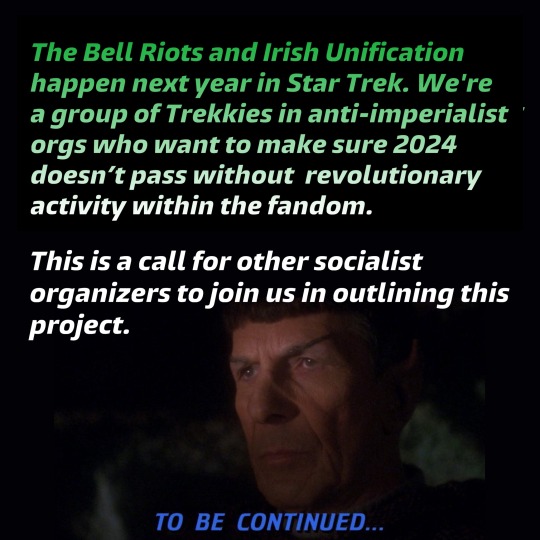
IF YOU SUBMITTED A FORM but still haven’t received your invite on Signal, please check the Signal app or double check that you have an account with the number you gave.
A list of represented orgs has been added to the sign-up form with permission. Those not affiliated with some type of apparatus for revolutionary work will be contacted at a later time.
SIGN-UP FORM: https://forms.gle/7FaJ88VBcwvbFzhy7
We’re a group of Trekkies in anti-imperialist orgs who want to make sure 2024 doesn’t pass without revolutionary activity within our fandom. Our prime directive is to help bridge the gap between the revolutionary momentum among fans and the ongoing revolutionary work needed to actually fulfill it.
This is a call for other socialist organizers to join us in outlining this project. All anti-imperialist ideological tendencies are welcome and encouraged.
You will be added to a group chat on Signal after submitting the above form. The next step will be a brainstorming session in January. We already have some ideas, but we want to hear everyone's ideas and reach a consensus together about a basic plan.
We appreciate the shared understanding that our mention of fictional events, when given the context of work well beyond the scope of acute confrontations which would never begin on social media, are merely convenient references to late-stage capitalist crises that already actually occur.
We will be making this call for the rest of the month.
50 notes
·
View notes
Text

“You are a pro-war anarchists.” We’ve heard this so many times. So many times we’ve had to explain that the war is a horrible tragedy for everyone living in Ukraine, and more than anything we want to achieve peace. Sustainable and fair peace. But here’s the key reason that prevents that: the Russian Federation, which continues to capture Ukrainian territories and wipe entire cities off the face of the earth. And today, the whole world can witness that.
The ceasefire conditions can hardly be called fair (20% of Ukrainian lands remain under occupation, about 16,000 prisoners of war are in Russian prisons, and postwar recovery will cost Ukraine 0.5 to 1 trillion euros). Despite this, Ukraine declares its readiness for a temporary ceasefire as the first step towards a long-term peace agreement. Russia, in contrast, demonstrates unwillingness to participate in this process. Shortly, we will hear a lot of declarations about how much Russia wants peace, but… And the “but” will be followed by a thousand reasons why even a temporary ceasefire is impossible, and why Russian troops must continue to advance in Ukraine.
We would like to see all these “anti-war left” who have spent so much time criticizing the supply of weapons to Ukraine “for the sake of peace” to finally notice the other side of the conflict. The actual culprit of why this war even began and has been going on for three years: is the authoritarian Russian regime. And, at the very least, to see them stop blaming the victim and criticizing weapons supplies. See them realize that capturing lands costs the lives of not only people in the military but also civilians because for civilians the war does not end when occupation begins.
We are closely watching the global political events, but we know that the real resistance to the aggressor is done by the people of Ukraine and international volunteer soldiers, including our comrades. It is their extraordinary effort that allows politicians in high offices to argue among themselves, make peace, and discuss conditions. So let’s continue to support our fighters and never forget whose side everyone who strives for real peace, not capitulation to empires, should be on today.
#ukraine#russia#politics#imperialism#anti-imperialism#anarchism#left#russian imperialism#anti imperialism#politics and business
22 notes
·
View notes
Text
Marcos Jr. sells out PH sovereignty for US war preparations vs China
NDF-International | National Democratic Front of the Philippines
April 10, 2024
Marcos Jr.’s trip to the United States for a trilateral summit with US President Joe Biden and Japanese Prime Minister Fumio Kishida is an utter and complete sell-out of Philippine sovereignty to US war designs in Asia. The so-called “trilateral summit” is set to discuss “maritime security cooperation” between the three countries.
Marcos Jr. is willingly offering the Philippine archipelago to serve as a ‘theater of war’ by allowing the US to position its military arsenal on land, sea, and air. The Philippines is a crucial piece in the “US Island Chain strategy” to contain China. The Philippines’ strategic location allows the US to constrict regional waterways and position readily deployable military air power in close proximity to China. In order to achieve its objectives, the US is escalating war preparations in the region by encouraging Japan and other imperialist allies to join the geopolitical chess game.
In the said trilateral meeting, Marcos Jr. seeks to further increase US military footprint in Philippine soil while talks are underway with Japan for a reciprocal access agreement that will allow Japanese military presence in the country. In fact, preparations are already ongoing for the biggest Balikatan Exercises in history which is expected to draw at least 16,000 troops to participate. The Balikatan war games this year aims to test the so-called ‘Comprehensive Archipelagic Defense Concept (CDAC)’ patterned after US imperialist war plans in the region. These actions form part of the US strategy to provoke China into “firing the first shot” demonstrating the US government’s bloodthirst.
On the other hand, Marcos Jr.’s actions prove his outright subservience to US imperialist war preparations and his readiness to drag the Filipino people in the middle of a brewing inter-imperialist conflict. Marcos Jr. must be held accountable for his reprehensible sell-out of Philippine sovereignty and his blatant disregard for the lives of the Filipino masses. More importantly, the Biden administration must be denounced for its continued exportation of wars of aggression from Ukraine to Palestine and now using the Philippines as a pawn in its attempt to stifle China’s growing influence.
35 notes
·
View notes
Text

Lebanon, Gaza, Ukraine: No to the supply of arms and the sending of mercenaries
From the Union of Political Emigrants and Political Prisoners of Ukraine and International Antifascist Solidarity with Ukraine (IUAFS):
We call for the cessation of arms deliveries from the United States, France, Great Britain, Germany, and other NATO members to the illegitimate Zelensky regime in Kiev and for an end to requests for deep missile strikes on Russian territory!
We also demand an end to the current attacks against Gaza, Lebanon, Syria, and Iran!
#antiwar#anti-imperialism#Lebanon#GazaGenocide#Ukraine#war crimes#arms embargo#political prisoners#StandWithDonbass#FreePalestine#Struggle La Lucha
23 notes
·
View notes
Text
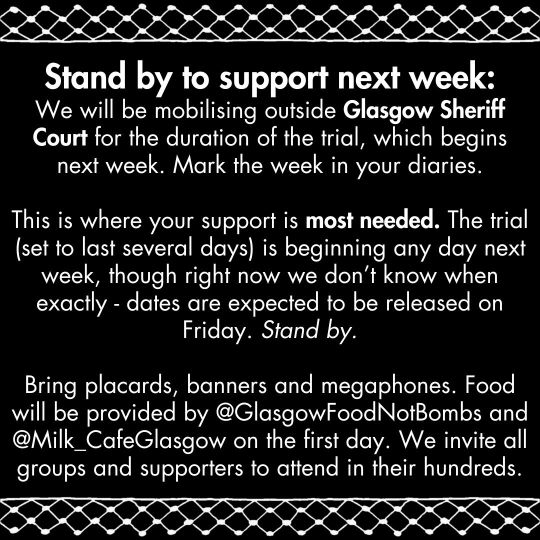
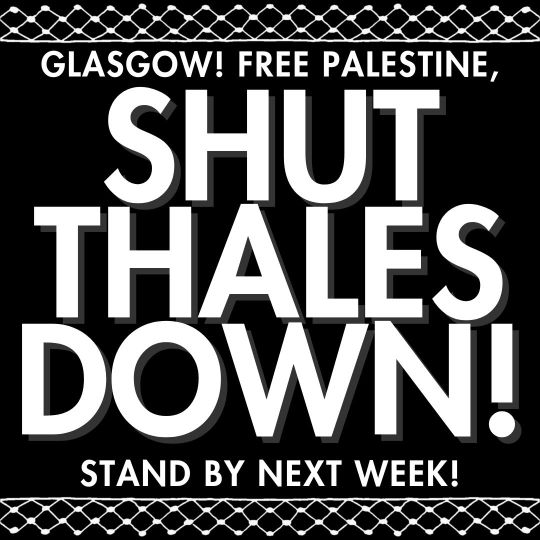
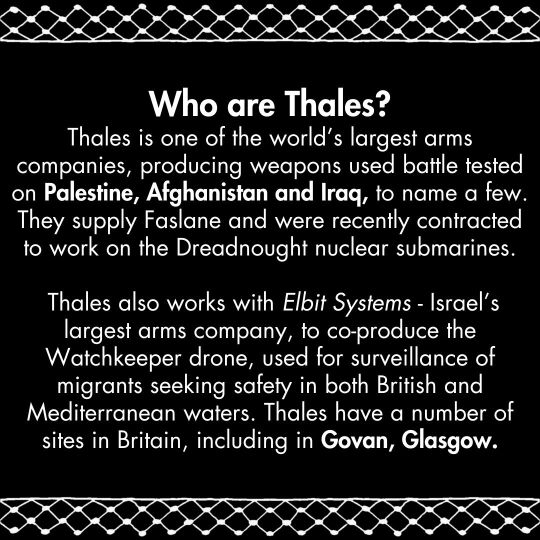
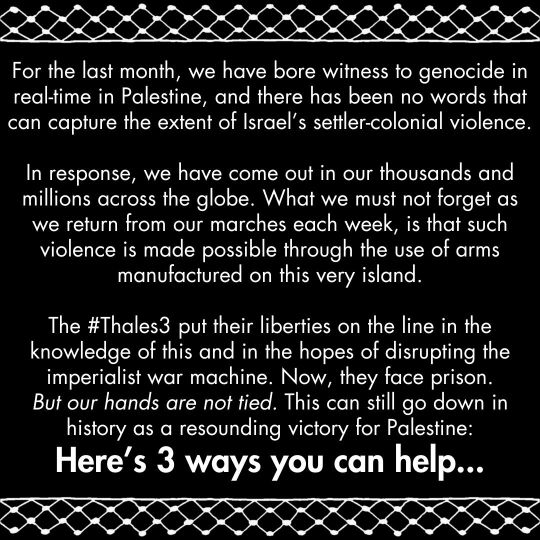
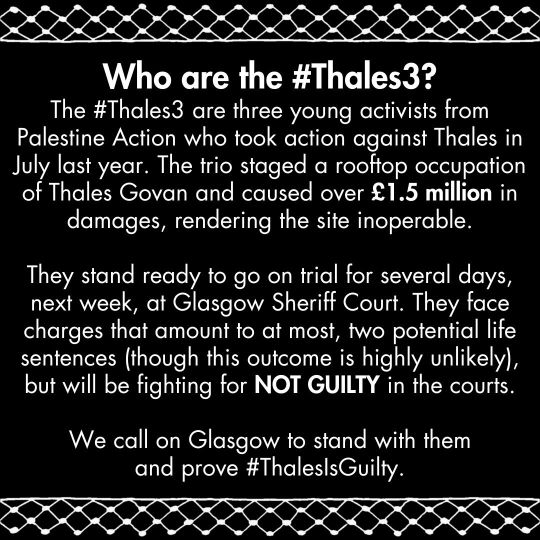
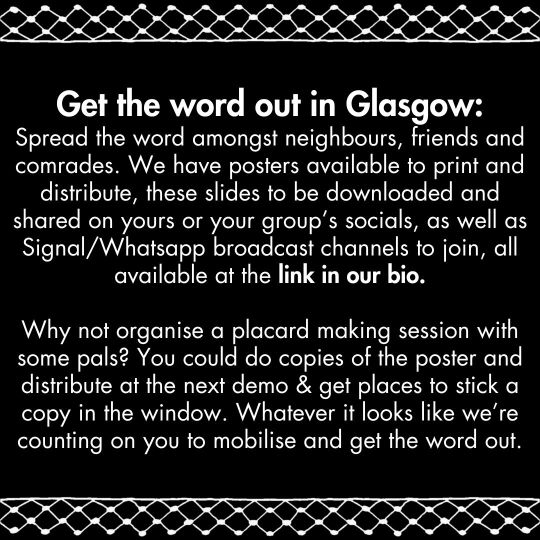
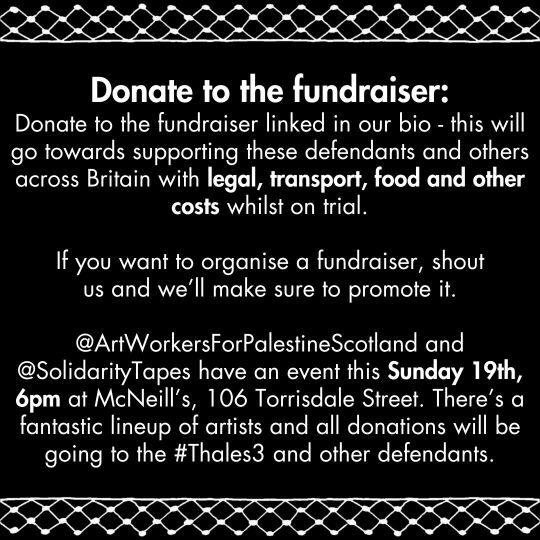
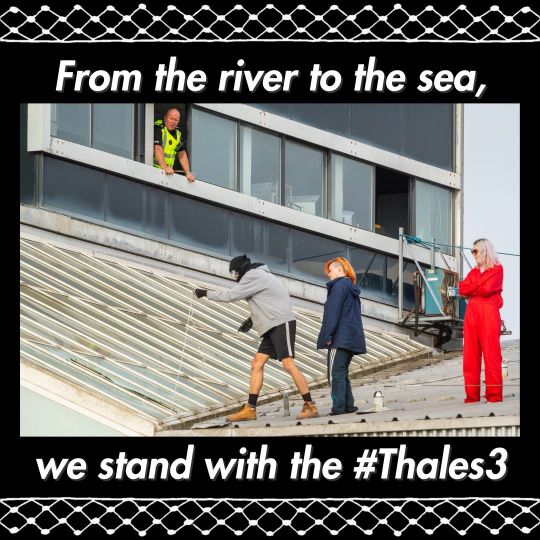
Fellow Glaswegians and Scots, share and spread the awareness please.
If you are unable to show up in person or don't live in Scotland, again share whats happening with everyone and consider donating too if you can.
49 notes
·
View notes